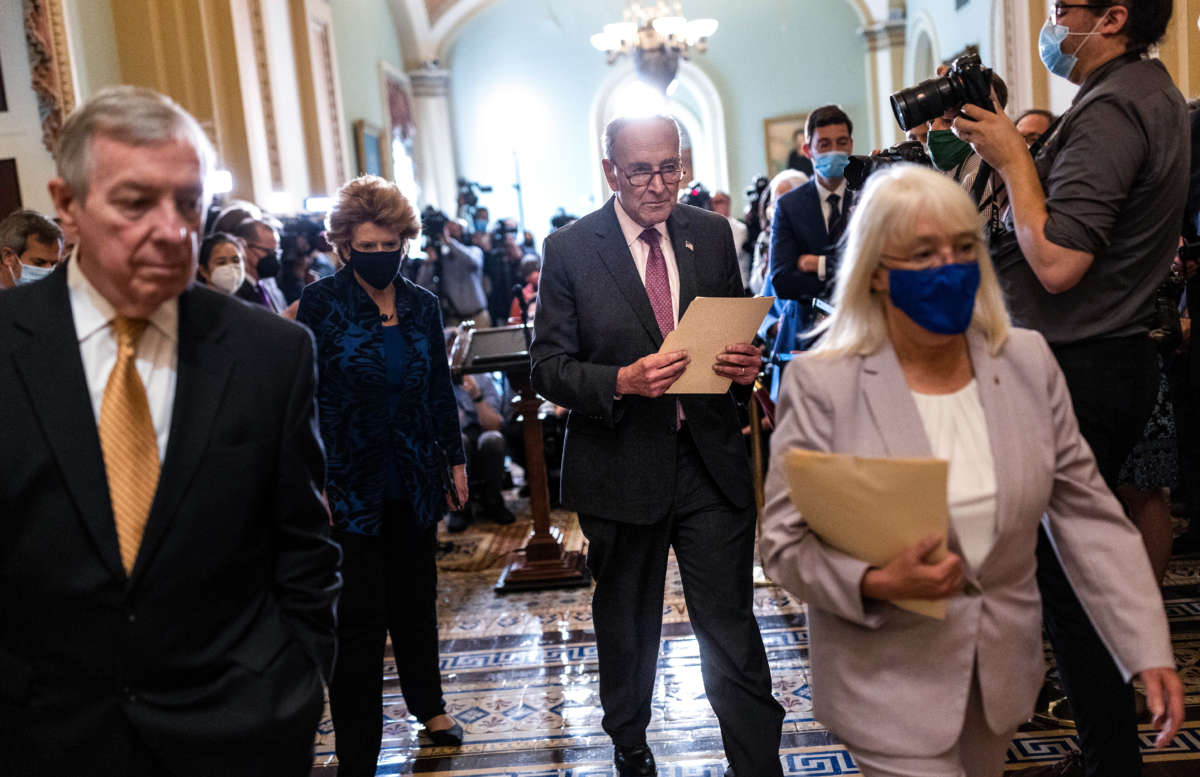Truthout is an indispensable resource for activists, movement leaders and workers everywhere. Please make this work possible with a quick donation.
On Wednesday evening, Senate Majority Leader Chuck Schumer (D-New York) announced that Democrats and Republicans in the Senate had reached a deal to avert a government shutdown this week.
On Monday, Republicans blocked efforts to fund the government beyond the midnight deadline on Friday morning. Without a continuing resolution to produce more funds, there was the possibility of a government shutdown, which would have resulted in the sudden halting of a number of federal services for an indeterminate amount of time.
Schumer announced that Republicans had agreed not to block a new vote on the measure, set to come sometime midday on Thursday — hours before the deadline would have been reached.
“We have an agreement on the CR — the continuing resolution to prevent a government shutdown — and we should be voting on that tomorrow morning,” Schumer said on Wednesday night.
The resolution is set to keep the government open through at least December 3. It will include funding for emergency services, such as disaster relief, as well as funding for the resettlement of Afghan refugees.
Upon passage, the bill will likely be voted upon and passed in the House of Representatives later that day, and signed into law by President Joe Biden.
The agreement on the continuing resolution is a significant development, as it will avert a crisis that would have started this week. One analysis found that as many as 6 million jobs could have been lost if government funding wasn’t continued on Thursday.
Although the measure addresses how the government will be funded for the next two months, it does not resolve the raising of the debt ceiling. The U.S. is set to default on its debt obligations around October 18 if nothing changes in the immediate future, a situation that could come with serious economic repercussions.
Defaulting on the debt could mean the U.S.’s ability to borrow money will be negatively impacted. In 2011, the mere possibility of default led to the nation’s credit rating being downgraded by Standard & Poor’s for the first time in 70 years.
Failing to adjust the debt ceiling wouldn’t just affect the government’s credit rating — it would also have rippling effects on the rest of the country, and could cause a recession that would damage an already weakened economy.
“It would only take a couple of months of missing federal payments due to the debt ceiling to mechanically send the economy into recession — and that’s without assessing damage it would cause from financial market fallouts,” an assessment from the Economic Policy Institute warned.
Some lawmakers believe that Congress should no longer have the responsibility of managing fiscal crises. On Thursday morning, Rep. Brendan Boyle (D-Pennsylvania) tweeted that legislation he proposed with Rep. John Yarmuth (D-Kentucky) could ensure that debt limits would never be a political issue to be debated on again.
This artificial crisis is COMPLETELY avoidable,” Boyle tweeted. “The Debt Ceiling Reform Act that @RepJohnYarmuth and I introduced [Wednesday] would fix this problem.”
According to a press release from Boyle, the proposed bill “would eliminate the debt limit as we now know it” and would transfer the authority to raise the debt ceiling to the Treasury Department.
A terrifying moment. We appeal for your support.
In the last weeks, we have witnessed an authoritarian assault on communities in Minnesota and across the nation.
The need for truthful, grassroots reporting is urgent at this cataclysmic historical moment. Yet, Trump-aligned billionaires and other allies have taken over many legacy media outlets — the culmination of a decades-long campaign to place control of the narrative into the hands of the political right.
We refuse to let Trump’s blatant propaganda machine go unchecked. Untethered to corporate ownership or advertisers, Truthout remains fearless in our reporting and our determination to use journalism as a tool for justice.
But we need your help just to fund our basic expenses. Over 80 percent of Truthout’s funding comes from small individual donations from our community of readers, and over a third of our total budget is supported by recurring monthly donors.
Truthout has launched a fundraiser, and we have a goal to add 273 new monthly donors in the next 72 hours. Whether you can make a small monthly donation or a larger one-time gift, Truthout only works with your support.
